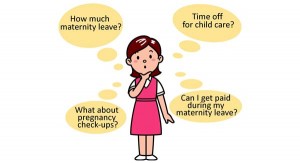In this blogpost, Sakshi Jain, a student of Amity Law School, Lucknow Campus writes about ten laws that every Indian woman should know.
Women are the most precious gems of the society. Protection of women should be one of the key priorities of the laws of any country and the society at large. Various laws are made for protecting and safeguarding the interests of women. In the 21st century, women are increasingly seen to be excelling in diverse fields and are utilizing their potential in the best possible way. There are certain laws and amendments to such laws that every woman in India should be aware of. When a woman is well aware of her rights, only then can she raise her voice against discrimination and abuse and can fight it back. As we all know ‘where it is right, there is a remedy.’ So every woman should know her rights as it is indeed her right to know all the rights provided to her by the Parliament.
Right against sexual harassment
Sexual harassment lowers the dignity of a woman and makes it uncomfortable for her to live in the society. Women also feel unsafe in the organization they work for because harassment can come be done by anyone i.e. peers, co- workers, higher authority, etc. When a woman faces harassment in any organization, it comes in the way of her work and restricts her from reaching the potential goals and targets set by her. Women are climbing the ladder to success in a similar pace as compared to men. It is not necessary that only lower paid employees are harassed. Highest paid women employees are harassed too in an organization. So, when sexual harassment is done in the work environment, it lowers the esteem of women and disallows them to carry on their work with efficiency and optimum productivity.
Bullying a woman and questioning the character and dignity of women is a punishable offense under Section 294, 254 and 509 of Indian Penal Code, 1860. Under Ontario Human Rights Code, Sexual Harassment is “engaging in a course of vexatious comment or conduct that is known or ought to be known to be unwelcome”. It also says that every person has the right to be free from discrimination based on sex, and it includes sexual harassment.
The Hon’ble Supreme Court issued guidelines to create a sexual harassment committee to resolve all the matters of harassment within an organization. The committee must be headed by a woman and participation of at least 50% of women is a must.One of the members of the committee should be from women’s welfare group. Every institution should have a Sexual Harassment Cell for the welfare of the employees.
Right to maternity benefits
Benefits for the pregnant women, before and after the birth of a child are governed under the Maternity Benefits Act, 1961. Maternity Benefits grant a paid leave to all the women before and after her pregnancy.This Act was enacted by the Parliament because many cases of breach of contract were reported due to pregnancy.So this Act came into force for safeguarding the interests of women and the organization. This Act applies its to every factory, mining, and plantation industry. It further extends to any shop or establishment within the territory of India. For Maternity Benefits, following should be kept in mind:
- The organization must have 10 or more employees working with it.
- It is necessary to work with the organization for not less than 12 months.
- Prior notice i.e. before seven weeks should be given to the head of the department or institution.
- The leave can be taken six weeks before the expected delivery date.
Every woman is entitled to receive the maternity leave with full pay for 12 weeks before delivery, six weeks after delivery and additional benefits like a bonus, allowances, etc. should be given to her. Under the Maternity Benefits Act, no employer can employ a woman after six weeks of her delivery or miscarriage. It is illegal to dismiss her on account of not being present there during her pregnancy. No employer can take the advantage of her pregnancy and alter the terms and conditions during maternity leave. In Indrani Chakroverty v. Idiom Consulting Ltd, 2012, Indrani Chakraverty sued Idiom Consulting Ltd for forcing her to relocate to Bangalore and cutting down her half salary on discovering her pregnancy, The Delhi High Court directed the company to compensate Rs. 7.5 lakh to Indrani.
Recently, women and Child Development minister, Maenka Gandhi made a proposal to the Labour Ministry for extending the dates of Maternity leave from 12 weeks to 26 weeks in private sectors only. The motive behind this was that around 48% of the women leave their jobs due to pregnancy and further responsibilities.
Sex determination
Sex Determination is illegal and banned in India under Pre-Conception and Pre-Natal Diagnostic Technique Act. Pre Natal Sex Determination was increasing day by day. The main aim for banning sex determination was the increasing rates of abortion as well as falling sex ratio in India. Because of Sex Determination, female foetuses were killed and due to this, there was an imbalance in the sex ratio. This law was introduced in the Parliament in 1994 and came into force in 1996. The Act makes it illegal to determine the sex of the foetuses. The law does not only focus on banning the practice of sex determination but also any advertisement which promotes for pre-conception and pre-natal determination of sex. The Act makes sex determination an offence, and anybody who does it will be punishable and liable to fine too. Ultrasound clinics and genetic counseling centers cannot be used for conducting pre-natal sex determination expect for diagnosing the abnormalities or sex related genetic diseases.
Free legal aid
Free legal aid means giving free legal service to the poor and needy people who are unable to afford the cost and service of an advocate for the conduct of any case or legal proceedings in any court or tribunal. Free legal aid itself means giving legal service free of cost to the needy people of our country. Free legal aid is mentioned in Article 21 and Article 39A of the Constitution of India. Article 39A states that “The State shall secure that the operation of the legal system promotes justice, on a basis of equal opportunity, and shall, in particular, provide free legal aid, by suitable legislation or schemes or in any other way, to ensure that opportunities for securing justice are not denied to any citizen by reason of economic or other disabilities.”
The state is responsible for safeguarding the interest of the poor and needy. It is the duty of the State to see that the poor are getting the benefit of this provision and if not, then the State is liable for the arrangement. In Hussainara Khatoon v. the State of Bihar, it was held that if the accused is not being able to afford the legal service, then he has the right to avail it at the cost of the State.
Section 304 of Code of Criminal Procedure, 1973, states that if the accused does not have any mean to afford a lawyer, the court must provide one for the defense of the accused at the expense of the State. The main difficulty is that people do not know their rights for their protection under the law. So, there should be proper awareness so that poor people can come to know about their rights. A woman can demand a lawyer whenever she goes to the police station for filing her complaint or recording her statement. In Khatri II v. the State of Bihar, it was held that a lawyer must be provided for a full-time service i.e. from the beginning of the proceedings till the end of it.
After the ruling given by the Delhi High Court, whenever a case of rape is reported to the police station, it is the duty of the head authority to pass on the report and details to Delhi Legal Service Authority, and then the service authority will provide a lawyer for further proceedings.
Right to privacy
Article 21 of the Indian Constitution says, “No person shall be deprived of his life or personal liberty except according to procedure established by law.” Right to life is enshrined in Article 21 which means living life with dignity. It does not mean mere survival or living like an animal. Right to life means a lot more than mere survival and makes a man’s life more important and meaningful.
Right to life includes right to privacy. Every individual has their space and privacy in life and infringement of it is punishable. A woman’s life should not be made for entertainment. Under Section 164 of Code of Criminal Procedure, a woman who had been raped can record her statements before the magistrate and no one will be allowed to attend the session. She can also lodge a complaint in the police station with a police officer and a lady constable. The statement should be taken in such a place where the information will not pass to a fourth person. It will be the responsibility and duty of the police officer to make the information confidential. Right to privacy encourages a woman to file a complaint and to give all the details about the incident. They feel safe and comfortable as they are protected under the law.
Right to equal pay
“Equal Pay for Equal Work,” our Constitution guarantees right to equality to every citizen of the Country. Right to equality is mentioned under Articles 14-18 of the Constitution of India. We are equal as per the law, and no one is above the law. The concept of equality in pay i.e. equal pay for equal work is the part of Article 39(d) of Directive Principles of State Policy. The aim of equal pay is equal distribution of resources of production among the citizens. Resources should not be limited to a few hands. The term equal pay includes basic salary and other benefits such as bonus, allowances, medical facilities, etc. It was done to make India a welfare society and wipes out discrimination from our country. Article 39(d) states that there is equal pay for equal work for both men and women. Discrimination should be eliminated on the basis of sex. After the law makers have mentioned equal pay in the Constitution, Equal Remuneration Act came into force in 1976 with the same aim, ‘equal pay for equal work.”
When the potential of doing the work by men and women is the same, then both should be paid equally. Being a woman does not lead to lesser payment in comparison to men. In Randhir Singh v. Union of India AIR 1997 SC 3014, the Hon’ble Supreme Court held that although the principal of equal pay for equal work is not expressly declared in our Constitution to be a fundamental right, it is certainly a constitutional goal under Article 14, 16 and 39(d) of the Constitution. Equal pay for equal work includes daily wage workers, temporary employees, and permanent employees.
Right to confidentiality
Women have a reputation in the society which should not be destroyed by any mean. When a rape victim lodges a complaint in the police station, it is the duty of the police officer to keep the identity of the victim confidential. Section 228-A of Indian Penal Code makes disclosure of the identity of the victim in certain offenses punishable. Offenses under Section 376A, Section 376B, Section 376C, Section 376D and Section 376E of Indian Penal Code are offensive and punishable for the disclosure of identity. Neither the police nor the media can publish or print any matter which may make known the identity of the victim.
Section 228-A (3):
Whoever prints or publishes any matter about any proceeding before a court on an offense related to disclosure of identity without the previous permission of the court shall be punishable with imprisonment for two years and shall also be liable to fine.
Right to virtual complaint
Women fear humiliation and bullying done to them by the society. In certain cases, women are not secure in the police stations as well. It is very difficult to seek justice in such an environment where women itself are not safe. In some places in India, cops are not co-operative and deny lodging the complaint. To put limits upon all these actions, Delhi Police issued guidelines that any woman can lodge a complaint via mail or registered post. If she cannot go to the police station, then she can send a written complaint through mail or post addressing it to a senior police officer. A rape victim can lodge a complaint, and no police station and cop can deny registering her FIR. Women feel unsafe while lodging a complaint so as to preserve her reputation in the society and also the fear of the culprits. So, virtual complaint protects women’s interest and reputation.
Right against arrest
Women have the right not to be arrested after sunset and before sunrise. Many crimes have been recorded when women were arrested at night. So, the Hon’ble Supreme Court issued the guideline of not to arrest women between 6:00 P.M. and 6:00 A.M. It is also mentioned that women cannot be arrested even if a lady constable is present there between sunset and sunrise. But in case of emergency, cops can arrest a woman only when they have a written notice from the magistrate to arrest. When arrested, women should be locked up in a room separate from the men.
Right of not being called for interrogation
Women now do not have to go to the police station for interrogation. Section 160 of Code of Criminal Procedure makes it clear that women cannot be called to the police station for investigation. If the police have to investigate, then they have to go to her residence and interrogate her there in the presence of a lady constable and her family or friends. The investigation is a duty of the police officers, but the law made it clear that it should not hamper the dignity of women. Section 160 of Code of Criminal Procedure clearly states that any person, male being not more than 15 years and women do not have to attend the investigation in the police station whereby, police himself have to go to the residing place of women to interrogate.
 Serato DJ Crack 2025Serato DJ PRO Crack
Serato DJ Crack 2025Serato DJ PRO Crack















 Allow notifications
Allow notifications


